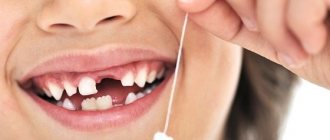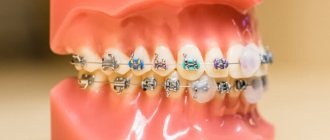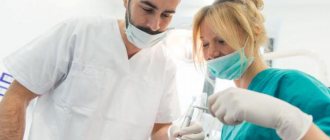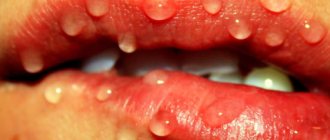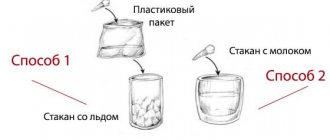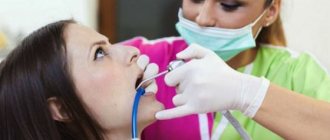Doubts about the advisability of prosthetics for primary teeth in children are based on concern, first of all, for the psychological comfort of the child, for whom dental procedures on temporary teeth become an “excessive” emotional burden. Dentists' arguments in favor of preserving baby teeth by all possible means relate, first of all, to the medical aspect and the physical health of the child as a whole. Moreover, modern methods of children's prosthetics allow the procedure to be carried out quickly and painlessly.
What are the most common dental and oral problems in children?
Children get to know the world around them primarily in a tactile way. They also often taste things to see how they taste. Of course, bacteria enter the oral cavity. And this, in turn, becomes the cause of inflammatory processes.
- Stomatitis. These are inflammations that appear on the oral mucosa in the form of white sores. It hurts to touch them with your tongue, eating becomes difficult, so the child may refuse to eat. Also, with stomatitis, body temperature may rise.
– Gingivitis. Inflammation of the gums. The pain becomes much worse when eating and brushing teeth, and the gums bleed.
– Inflammation as a result of injury to the oral mucosa. It may appear during teething or after the child has chewed something. Traumatic damage to the oral cavity can also occur due to wearing braces.
Also in our medical center you can correct your bite and crooked teeth using orthodontic treatment.
Children at an early age are highly susceptible to caries, because baby teeth are very fragile. It is also possible to cure carious lesions in primary and permanent teeth in our clinic.
Indications, types and features of children's prosthetics
The peculiarity of orthopedic techniques in pediatric dentistry is due to the process of growth and formation of the dental system, which imposes certain restrictions on the use of some technologies that are successful in “adult” dentistry, for example, implantation. At the same time, modern pediatric orthopedics has developed effective types of prosthetics for baby teeth in children and permanent teeth in adolescents, which do not disrupt the processes of growth and formation of jaw bone tissue.
The need for prosthetics of baby teeth, despite their temporary “status,” is due to the prevention of risks associated with their premature loss:
- increased load on the remaining teeth in the row;
- high probability of dentition displacement and problems with the eruption of permanent teeth;
- development of malocclusion;
- potential speech therapy problems;
- inadequate chewing of food – indigestion;
- aesthetic defect - complexes in the most crucial period of mental development.
Thus, the argument for orthopedic treatment is more than convincing, of course, if therapeutic or surgical treatment is impossible. The main indications for prosthetics can be:
- deep caries with the impossibility of installing a filling;
- trauma to the crown or root of the tooth;
- fluorosis – severe darkening or destruction of enamel;
- inflammation of the periosteum;
- early loss of baby teeth;
- severe enamel damage.
Prescription for prosthetic treatment of primary teeth in children and adolescents is determined by the attending dentist and orthopedist based on a thorough diagnosis, which at the UnderSon clinic is provided with modern equipment for x-rays and orthopantomograms. The appropriate technique is selected based on diagnostic data, personal examination, individual characteristics of the dental system and the psychological characteristics of the small patient.
Children's crowns
One of the most common methods of children's prosthetics is the use of special children's crowns. This is relevant in cases:
- large-scale, but not complete destruction of the visible part of the tooth;
- chips and fractures of the crown;
- congenital defects of structure and shape.
The main condition for installing a crown is complete healing of the tooth, whether it is cleaning carious surfaces or eliminating pulpitis - the tooth under the crown should not be disturbed. In some cases, crown prosthetics is preferable to filling:
- reliable fixation – the crown stands firmly where not every filling will last long;
- carious processes are excluded;
- better protection against tooth trauma;
- strength of the crown against chipping, grinding, and fracture;
- no retreatment required;
- high aesthetics of ceramic crowns on front teeth.
Installation of children's crowns at the Anderson Clinic is a quick and painless procedure, since ready-made blanks selected in shape and size from high-quality, hypoallergenic materials are used. For anterior teeth - ceramics, for chewing teeth - biocompatible alloys on a nickel-chromium basis. In certain cases, the necessary types of anesthesia are used.
Plate dentures
Special designs that provide restoration of the dentition in place of lost one or more molars due to:
- early removal of chewing teeth - prevention of dentition displacement and improper eruption of permanent teeth;
- removal of frontal incisors;
- when the crowns are destroyed, but the roots of the primary incisors of the upper jaw are preserved, which are cleaned and filled before prosthetics.
The unique bridge is secured using special locking mechanisms. Such a bridge effectively replaces lost teeth in a row, and does not affect the formation and growth of the dental system since it is a removable structure that allows you to adjust its parameters during the growth and formation of teeth and jaw.
Microprosthetics
A worthy alternative to fillings and even crowns in the prosthetics of baby teeth in children is tooth restoration with a special inlay. One of the advantages of this technique is the production of a microprosthesis outside the patient’s mouth, which allows the formation of an ideal model of the surface of the damaged tooth.
Advantages of microprosthetics:
- restoration of tooth functionality;
- high aesthetic characteristics;
- ideal adaptation to the bite and adjacent teeth;
- strength;
- reliability of fixation.
Restoring the ideal shape and functionality of the tooth with special inlays is ensured by computer modeling technologies and high-quality dental materials.
At what age should a child start visiting the dentist regularly?
The initial visit to the dentist is carried out at the age of 6-7 months. This is the age at which baby teeth just begin to emerge.
The next scheduled trip to the doctor should be made between the ages of 2 and 3 years. The dentist will diagnose the oral cavity, because dental health should be maintained at any age. At the appointment, you can ask the doctor all your questions regarding the development of your baby’s teeth.
Our medical center also accepts emergency patients. If your child has a severe and unexpected toothache, we will be happy to help eliminate the cause of the discomfort.
Children's prosthetics at the UnderSon clinic
The procedure for dentures of baby teeth in children in our clinic is quick and painless, thanks to:
- minimal tooth treatment;
- a set of ready-made crowns;
- computer modeling of microprostheses and plates;
- high quality materials;
- experience and professionalism of doctors;
- various types of anesthesia.
The specialization of our clinic in pediatric dentistry determines all the conditions and methods used to ensure dental health, proper development and formation of the dental system for children of all age groups.
| Standard 3M metal crown (for primary or permanent molars); NewSmile crown on one of the front baby teeth | 3,000 rub. |
| Artificial cast crown (for permanent painter) | 8,000 rub. |
| Metal-ceramic crown (for a permanent tooth) | 10,000 rub. |
| Taking an impression | 1,000 rub. |
| Manufacturing of removable lamellar prosthesis | 25,000 rub. |
Appointment with a pediatric dentist in Izmailovo
Many children are very worried before going for dental treatment. That is why an important task of a child specialist is to create a relaxed and friendly atmosphere. The doctor carefully approaches the treatment of young patients and does everything to ensure that the child has only good memories from his visit to the dentist.
The inspection is carried out in a playful way. Gradually, the child’s fear becomes less and less, and an interesting game brings the child pleasure from the treatment.
Make an appointment for your child with a pediatric dentist at our clinic. Our doctors will teach your child how to properly care for their teeth and carry out treatment quickly and painlessly.
Emergency dental surgery for children
Our center hosts pediatric dental and maxillofacial surgeons who are ready to provide specialized care in case of emergency. We not only perform emergency operations on the jaws, but also provide high-level first aid in severe conditions, having all the necessary equipment and medications for this.
Emergency dental care is necessary for a child in the following cases:
- acute pain;
- the presence of a pathological focus in the problem tooth, which can at any time spread the infection throughout the body;
- odontogenic diseases: inflammatory processes of the maxillofacial area, where the tooth acts as a gateway to infection (odontogenic sinusitis, periostitis, abscesses, perimaxillary abscesses, lymphadenitis, etc.);
- acute stage of odontogenic osteomyelitis;
- injuries to the bones and joints of the jaw;
- soft tissue injuries of the oral cavity
- significant fractures and dislocations of teeth;
- any injury related to the upper or lower jaw.
Evaluation of the 2020 rating results
More than 300 clinics across the country took part in the current All-Russian rating of private children's dental clinics Startsmile with the support of Kommersant Publishing House: we covered almost all medical institutions that provide dental services to children. From this number, 115 of the best clinics were selected and a final rating was compiled in two categories: “more than 3 years” and “less than 3 years.” It is a little disappointing that few new specialized clinics are appearing in the latter category. I believe the main reason is the ongoing economic crisis, which makes it difficult for newcomers to enter the market. The 2018 Startsmile rating showed that only multidisciplinary medical clinics can afford to open a pediatric dentistry department. However, this, in my opinion, is not enough. Three hundred pediatric dentists throughout our vast country is extremely few, especially since the Startsmile study confirmed that dental services for children are in great demand. Even in those clinics that did not spend a penny on advertising and promotion, there was a steady flow of young patients.
Innovations that influenced the final grade
In 2020, we introduced a number of innovations and restrictions regarding the assessment of the work of a particular clinic. Firstly, dentists with more than 30% negative reviews from open sources on the Internet were not allowed to participate. In my opinion, this is an indicative moment of the work: there will always be random or unfounded negativity, but when it is noted on different platforms and comes from many users, it is already a pattern.
Another important innovation is personal visits to clinics. Startsmile specialists visited the Moscow dentistry offices that took part in the study and assessed the quality of the staff’s work, the environment, the availability of equipment and other aspects on the spot. It was painstaking and complex work, but it yielded invaluable results: the highest places were traditionally occupied by clinics in Moscow and St. Petersburg, so it was vitally important to ensure their high-quality and unbiased assessment.
Selection criteria for pediatric dental clinics
In terms of methodology, selection of participants and the introduction of new criteria, the 2020 Startsmile Rating has reached a new level - and this is certainly a great success. The requirements for clinics were and remain very strict: to participate in the study, the institution must have at least one office for receiving children and one specialized specialist. It is important that since the first children’s rating, the number of evaluation criteria has constantly increased: this year there are more than 200 of them. They cover all aspects of the clinic’s activities, from the quality of treatment to the nuances of service. Of course, great emphasis is placed on the clinical component: the number of rooms for receiving small patients, the level of technological equipment and the number of services, the experience of doctors and the presence of highly specialized specialists on staff: pediatric orthopedists, anesthesiologists and psychologists. It was also important that the clinic matched its image: the interior, the atmosphere, the presence of a game concept of treatment - all these factors played a significant role and were carefully analyzed.
Dental hygienists in Moscow
What is a dental hygienist?
A dental hygienist is a dentist or dental assistant whose responsibilities include conducting preventive examinations to prevent dental diseases. Any specialist who has received a dental education can work as a dental hygienist. This is a relatively new area in dentistry, but already very popular. Oral care is an element of culture, and not just a need for every person.
What do dental hygienists treat?
The point of the work of dental hygienists is to draw up the correct preventive program and plan of hygienic measures aimed at caring for the oral cavity. As part of his professional duties, the doctor must teach each of his patients the methods of caring for the entire oral cavity that exist today. At an appointment with a dental hygienist, the patient is examined to assess the condition of the teeth, gums, and jaw. The doctor performs visual manipulations, using special staining solutions to demonstrate the plaque on the teeth left after improper brushing. Next, the doctor carries out a set of measures to eliminate hard and soft plaque, which is recommended to be carried out twice a year. As an addition to this procedure, we offer:
- remineralization;
- fissure sealing, etc.
The dental hygienist selects individual dental products for each patient, which will help in the future to provide proper oral care. The selection takes into account the identified problems and the patient’s lifestyle. As a result of visiting a specialist in Moscow, an individual plan for the treatment and prevention of oral diseases is drawn up.
In addition to all of the above, the specialist’s responsibilities include:
- polishing fillings;
- detection of bite defects;
- removal of tartar;
- detection of anatomical anomalies;
- correction of occlusal contacts;
- assessing the effectiveness of oral hygiene;
- grinding the roughness of tooth surfaces;
- remineralizing therapy;
- periodontal applications.
If a pathology is detected, the dental hygienist in Moscow will refer the patient to an orthodontist.
When should you contact dental hygienists?
It is important for every person to contact a dental hygienist without waiting for an invitation or referral for an appointment. Dental treatment should begin with a visit to the hygienist. This will prevent many diseases. As a rule, any procedures performed are designed for a long period of action. Due to the preventive nature of the specialist’s activities, the dental hygienist must accompany the patient constantly, changing the diagnosis, adjusting the treatment plan, focusing on the patient’s condition. In Moscow, in his work, the doctor uses additional examination methods, such as:
- X-ray;
- dental CT;
- visiography, etc.
Where can I train to become a dental hygienist?
Dental hygiene courses are taught at all departments of dentistry. Training of professional hygienists for further work in Moscow clinics is carried out in such large universities as:
- MGMSU;
- MMA im. I. M. Sechenov;
- RNIMU named after. N. I. Pirogova;
- MONIKI;
- RMA;
- RUDN University, etc.
Development of the profession and emergence of specialists in Moscow
The profession of dental hygienist has existed, oddly enough, for quite a long time. It first appeared in 1834 in the USA. Even then, dentists transferred all functions in the field of protective and preventive measures to their assistants. After this, according to statistics, the number of caries lesions decreased by 60%. Further, dentists in almost all countries of the world began to resort to this method of prevention, offering patients a whole range of measures to protect the oral cavity and prevent diseases.
In Russia, the specialization of a dental hygienist was officially approved only in 2001. Currently in Moscow, all clinics offer personal preventive measures and the development of individual hygiene programs for the dental health of all patients.
